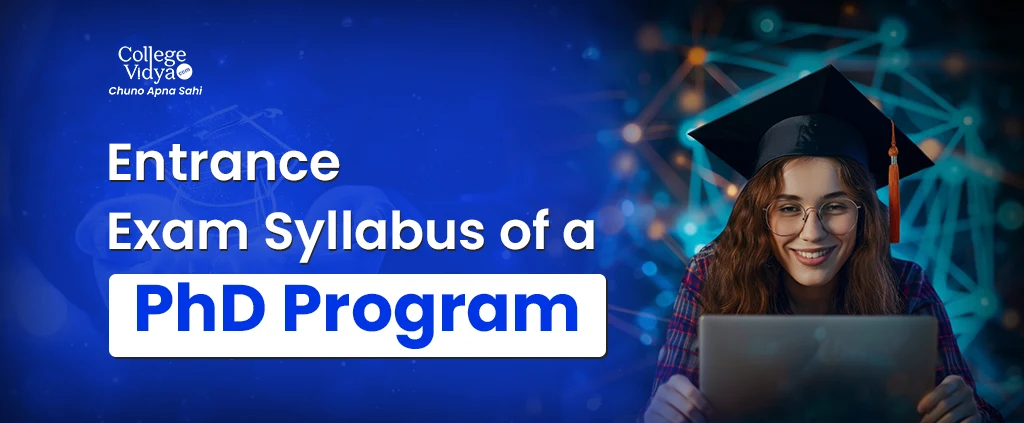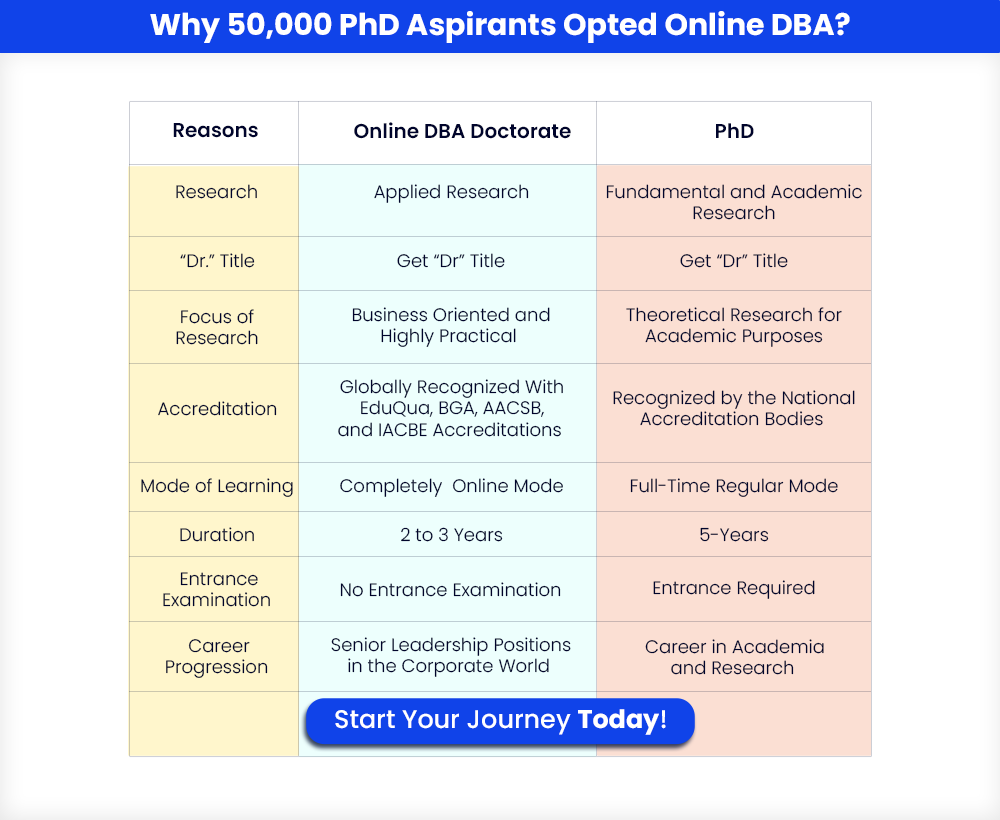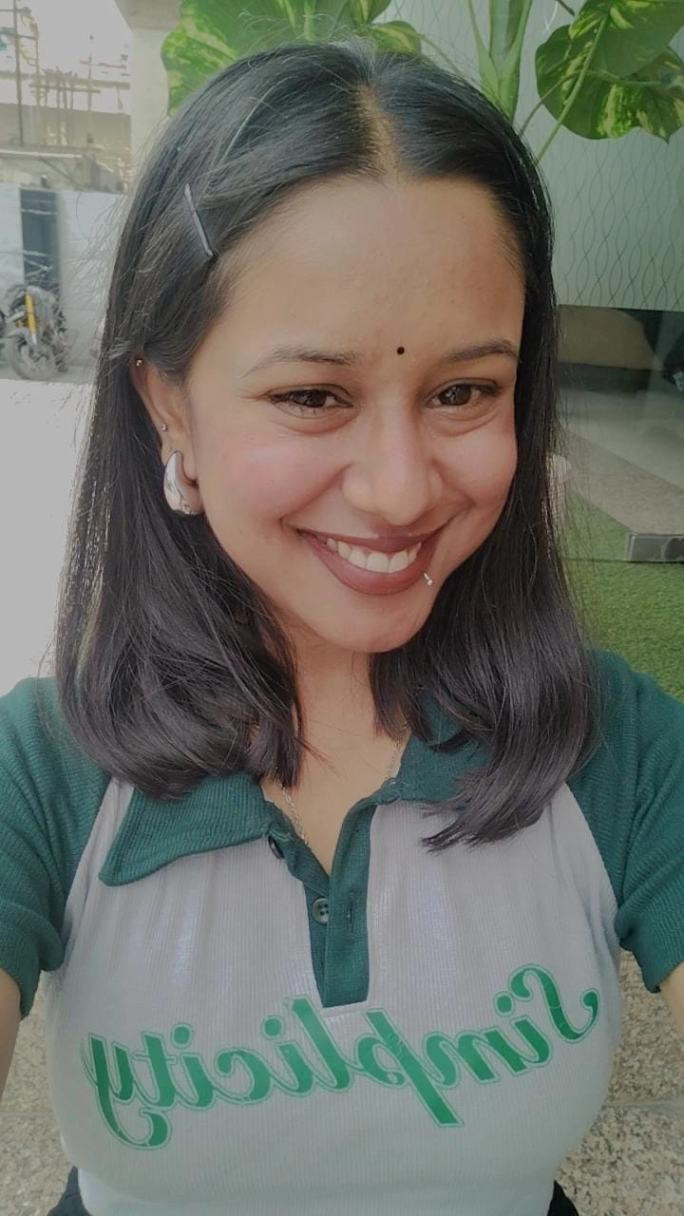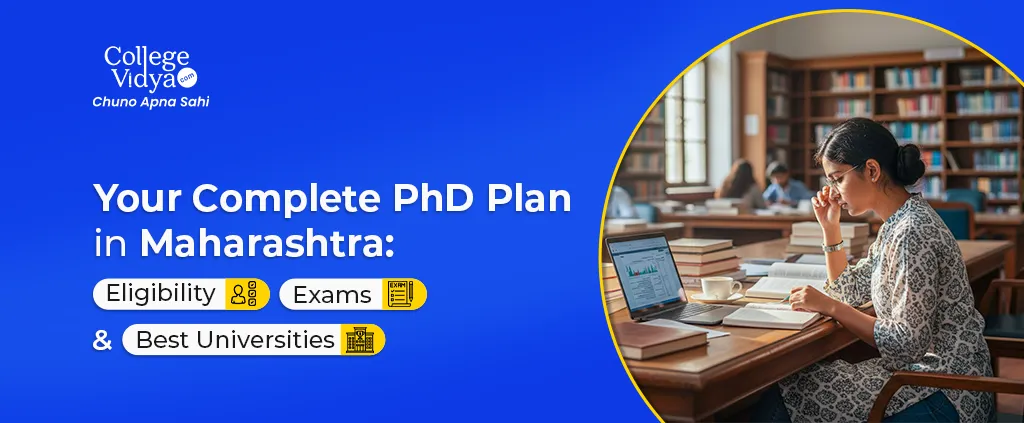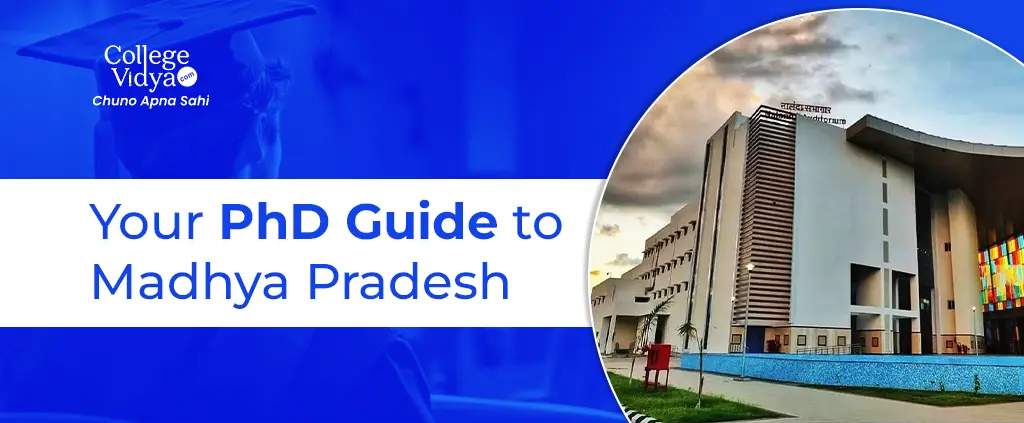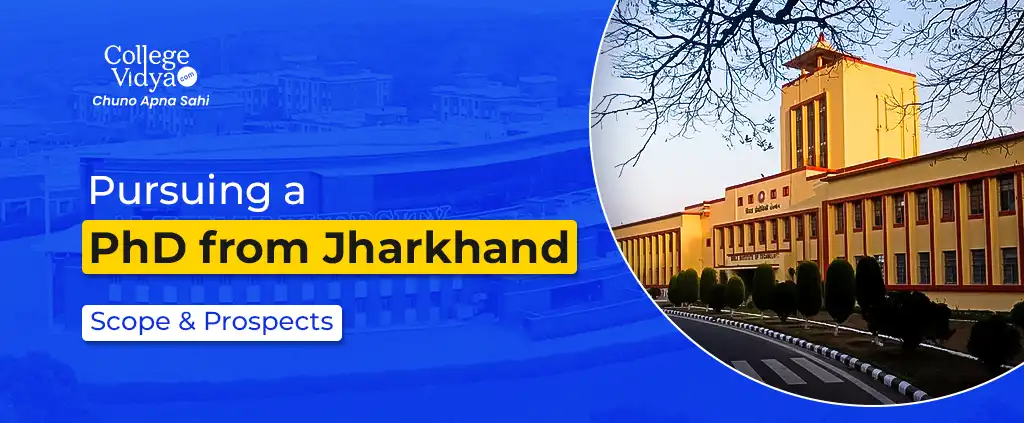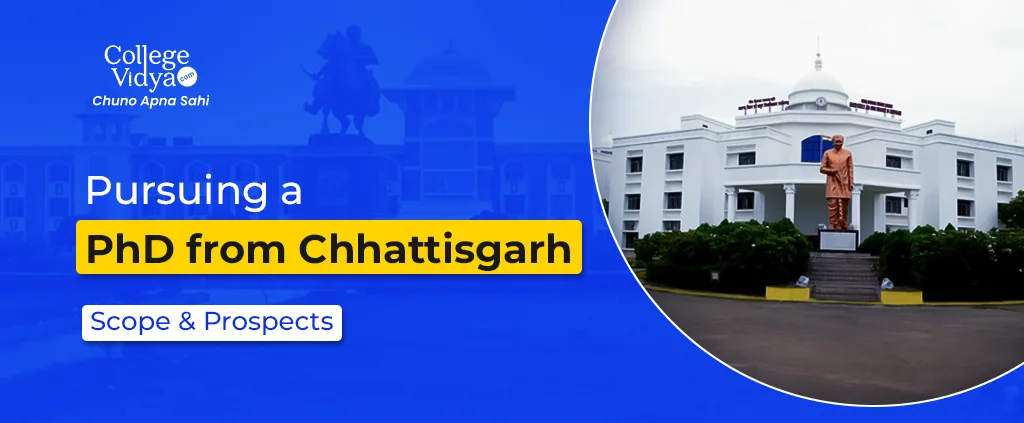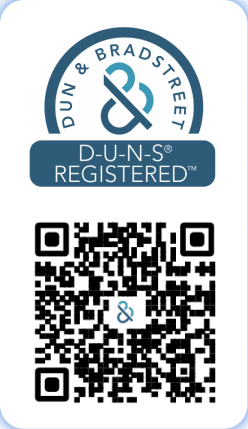Many entrance exams are conducted for a PhD admission and to become eligible for a PhD course, you need to complete a master's degree with at least 50% marks from a recognized institute. PhD admissions are based on entrance exam scores from exams like the CSIR UGC NET and other PhD entrance tests.
The syllabus for PhD entrance exams includes topics from 10+2, graduation, and post-graduation levels, such as technology, life sciences, mathematics, sciences, and general aptitude. The specific subjects and topics vary depending on the PhD specialization and sub-stream. The PhD syllabus focuses on research and practical aspects, with some theoretical knowledge.
Do you know that you can pursue a PhD program even without taking any entrance exam if you pursue its alternative? The best alternative to a PhD program that does not require any entrance exam is DBA. It stands for Doctor of Business Administration, it is specially designed for people who can attend daily classes and opting an Online DBA, they can easily earn their doctorate degree from an International university that too without even relocating to another country.
There are various universities offering you an Online DBA, some of them are mentioned below :
|
Universities |
Fees |
|
INR 8,14,000 |
|
|
INR 8,12,500 |
|
|
INR 8,14,000 |
What is the syllabus for a PhD Entrance Exam?
If you are preparing for an entrance exam for a PhD. then written below table will be helpful for you :
|
PhD Subjects |
Entrance Exam Syllabus |
|
Life Sciences |
|
|
Mathematics |
|
|
Basic Engineering and Technology |
|
|
Computer Information Science |
|
|
Political Science |
|
|
Economics |
|
|
Psychology |
|
PhD Entrance Exam Syllabus of Delhi University
The entrance exam of Delhi University for PhD is divided into 2 parts. Each part holds weightage off 50 percent marks :
|
Research Methodology |
|
|
Mathematical Tools for Research in Computer Science (part of Research Methodology) |
|
|
English Comprehension |
|
|
Computer Science (Subject Specific) |
|
PhD Entrance Exam Syllabus of IGNOU
Check the syllabus below for the IGNOU entrance exam :
|
PhD Subjects |
Entrance Exam Syllabus |
|
Ph.D. Anthropology |
|
|
Ph.D. Political Science |
|
|
Ph.D. Chemistry |
|
|
Ph.D. Geology |
|
Entrance Exam Syllabus for PhD: Subject Wise
There are various subjects of PhD and the syllabus of different subjects are also different. The syllabus of different subjects is mentioned below
1) Psychology
A PhD in Psychology is a three-year program that adds a Doctorate and after completing the program you get many opportunities in the medical field and academia. This program focuses on medical sciences and research projects, making it ideal for students interested in academic careers or research work.
To pursue a PhD in Psychology, you must have a postgraduate degree in Psychology from a recognized university with at least 55% marks. Admission can be based on entrance exams or merit. The course fee ranges from INR 20,000 to INR 2 lakh.
Top universities in India offering this program include Amity University, Lady Shri Ram College for Women, Galgotias University, and many more you can become a professor at a top university, a trained psychologist, or a researcher and analyst in the field of psychology.
|
Subjects |
Details |
|
Emergence of Psychology |
|
|
Biological basis of behavior |
|
|
Research Methodology and Statistics |
|
|
Psychological testing |
|
|
Attention, Perception, Learning, Memory and Forgetting |
2) Sociology
A Ph.D. in Sociology recognizes high achievements and independent research. It provides insight into environmental and social factors affecting different groups. Earning this degree usually takes 3 to 5 years for those with a Master's degree.
To be eligible, you need a Master's degree in Sociology with at least 55% marks from a UGC-recognized university. You must also pass national-level entrance exams like UGC NET, UGC CSIR NET, GATE, or SLET, or a university-level entrance exam that includes a written test and personal interview. Some universities also offer admission based on merit.
You can find the entrance exam syllabus for sociology below :
|
Subjects |
Details |
|
State, Politics and Development |
|
|
Economy and Society |
|
|
Sociological Theory |
|
|
Research Methodology and Methods |
|
|
Basic Concepts and Institutions |
|
|
Rural and Urban Transformations |
|
|
Environment and Society |
|
|
Family, Marriage and Kinship |
|
|
Science, Technology and Society |
|
|
Culture and Symbolic Transformations |
|
3) Anthropology
A PhD in Anthropology is a doctorate course. It takes a minimum of 2 years and a maximum of 6 years. This course is offered at prestigious institutes like Sikkim University, Ranchi University, University of Delhi, Punjab University, and Amity Institute of Anthropology.
The course covers social, cultural, and biological anthropology. It includes topics on social reformers' contributions.
Subjects taught include paradigms in social-cultural anthropology, contributions of social reformers and thinkers to Indian society and culture, and research methodology.
To be eligible, students must have a master’s degree in Philosophy from a reputed institute. Some institutes accept postgraduates from other disciplines. Admission is based on postgraduate marks or entrance test results.
The average tuition fee ranges from INR 7,000 to INR 1,30,000. After completing the course, candidates can find jobs in anthropology museums, colleges/universities, and heritage management companies.
You can find the entrance exam syllabus of anthropology below :
|
Unit Number |
Subjects |
|
Unit-1 |
|
|
Unit-2 |
|
|
Unit-3 |
|
|
Unit-4 |
|
|
Unit-5 |
|
|
Unit-6 |
|
|
Unit-7 |
|
|
Unit-8 |
|
|
Unit-9 |
|
|
Unit-10 |
|
4) History
A Ph.D. in History is a doctoral-level program. It takes between three to six years to complete. The curriculum is research-oriented, involving theses, publications, and research projects. Specializations include Ancient Indian History, European History, Islamic History, Medieval Indian History, and Modern Indian History.
You can find the syllabus of History mentioned below :
|
Unit Number |
Subjects |
|
Unit-1 |
|
|
Unit-2 |
|
|
Unit-3 |
|
|
Unit-4 |
|
|
Unit-5 |
|
|
Unit-6 |
|
|
Unit-7 |
|
|
Unit-8 |
|
|
Unit-9 |
|
|
Unit-10 |
|
5) Commerce
PhD Commerce stands for Doctor of Philosophy in Commerce. It is a doctoral degree. The course aims to make students experts in their fields and contribute to the corporate world. The PhD in Commerce lasts three years but can be extended to five years.
Students need at least 55% in their Master’s degree for PhD in Commerce Admission in 2026. They must also qualify with the required cut-off marks in entrance exams like SLET, UGC-NET, BHU-RET, etc. The subjects in PhD Commerce cover research methodologies and commerce.
PhD Commerce graduates can pursue careers in education, research, trading, and commerce. The average salary for a PhD in Commerce graduate is INR 9.80 LPA.
|
Subjects |
Details |
|
Legal Aspects of Business |
|
|
Income-tax and Corporate Tax Planning |
|
|
Business Environment and International Business |
|
|
Accounting and Auditing |
|
|
Accounting and Auditing |
|
|
Business Finance |
|
|
Business Statistics and Research Methods |
|
|
Business Management and Human Resource Management |
|
|
Banking and Financial Institutions |
|
|
Marketing Management |
|
IGNOU Entrance Exam Syllabus of PhD: Subject-Wise
If you are willing to gain admission at IGNOU for PhD, you must take an entrance exam and qualify for the interview round. Moreover, the subject-wise entrance exam syllabus is mentioned below.
1) Anthropology
You can check the entrance exam syllabus of Anthropology at IGNOU below :
|
Subjects |
Details |
|
Archaeological Anthropology |
|
|
Anthropology and Methods of Research |
|
|
Physical Anthropology |
|
|
Social Anthropology |
|
2) Chemistry
You can check the entrance exam syllabus of chemistry at IGNOU below :
|
Subjects |
Details |
|
Organic Chemistry |
|
|
Research Methodology |
|
|
Inorganic Chemistry |
|
|
Physical Chemistry |
|
3) Political Science
You can check the entrance syllabus of Political Science at IGNOU below
|
Subjects |
Details |
|
Globalization and International Relations |
|
|
Research Methodology |
|
|
Political Theory & Thought |
|
|
India: State and Society |
|
4) Geology
You can check the entrance exam syllabus of Geology at IGNOU below :
|
Subjects |
Details |
|
Geology Courses |
|
|
Research Methodology |
|
5) Life Sciences
You can check the syllabus of Life Sciences at IGNOU below :
|
Subjects |
Details |
|
Life Sciences |
|
|
Research Methodology |
|
6) Mathematics
You can check the entrance syllabus of Mathematics at IGNOU below :
|
Subjects |
Details |
|
Algebra |
|
|
Real Analysis |
|
|
Topology |
|
|
Functional Analysis |
|
|
Differential Equations |
|
|
Partial Differential Equations |
|
7) Commerce
You can check the Entrance syllabus of Commerce at IGNOU below :
|
Details |
Subjects |
|
Research Methodology |
|
|
Accounting & Taxation ACCOUNTING |
|
|
Taxation |
|
|
International Business |
|
|
Banking and Finance |
|
|
Marketing Management |
|
|
Entrepreneurship and Small Business Management |
|
8) Education
You can check the Entrance syllabus of Education at IGNOU below :
|
Details |
Subjects |
|
Subject Specific Areas |
|
|
Methodology of Educational Research |
|
9) Women’s Studies
You can check the entrance exam syllabus of women's studies at IGNOU below :
|
Feminist Research Methodologies |
|
|
Concepts And Theries In Women’s Studies |
|
10) Interdisciplinary and Trans-disciplinary Studies
You can check the entrance syllabus of Interdisciplinary and Trans-disciplinary Studies at IGNOU below:
|
Research Methods and Techniques |
|
|
Introduction to Interdisciplinary and Trans disciplinary Studies |
|
11) Environmental Science
You can check the Entrance syllabus of Environmental Science at IGNOU below :
|
Subject Areas |
|
|
Research Methodology |
|
12) Tourism Studies
You can check the entrance exam syllabus of tourism studies at IGNOU below:
|
Subject Specific |
|
|
Research Methodology |
|
13) Management
You can check the Entrance syllabus of management at IGNOU below :
|
Research Methodology |
Foundations of Research |
|
Research Process |
Interpretation of Data and Paper Writing –
|
|
Management (Financial Management, Human Resource Management, Marketing Management Operations Management, and General Management) |
|
14) Computer Science
You can check the entrance exam syllabus of computer science at IGNOU below:
|
Computer Science |
|
|
Research Methodology |
|
15) English
You can check the entrance exam syllabus of English at IGNOU below:
|
British literature: issues and debates, trends and movements |
Diaspora Studies |
|
Contemporary World Literature |
American Literature |
|
Multiculturalism |
Australian Literature |
|
Subaltern Literary Perspectives |
Folklore and Culture Studies |
|
English Language Teaching |
Research Methodology |
|
New Literatures in English |
Critical Theories |
|
Indian Writing in English |
Canadian Literature |
Entrance Exam Syllabus of Lingyas Vidyapeeth University
PhD at Lingaya Vidyapeeth the subjects include – Computer Science and Engineering, Mechanical Engineering, Civil Engineering, Electronics and Communication Engineering, Chemistry, Physics.
Mathematics, Commerce and Business, Education, Law, Psychology, and Pharmacy.
Lingayas University offers Ph.D. The program complies strictly with the UGC Act, 2022 and its amendments from time to time but with high academic standards.
The mentioned syllabus of the entrance exam for PhD at Lingyas Vidyapeeth is for all candidates-
|
Entrance Exam Syllabus |
|
|
Research Methodologies |
Meaning of Research, Objectives of Research, Motivation in Research, Types of Research, Research Approaches, Significance of Research, Research Methods Versus Methodology, Research and Scientific Method, Importance of Knowing How Research is Done, Research Process, Criteria of Good Research, Problems Encountered by Researchers in India |
|
Defining the Research Problems |
What is a Research Problem? Selecting The Problem, Necessity of Defining the Problem, Technique Involved in Defining a Problem |
|
Research Design |
Meaning of Research Design, Need for Research Design, Features of a Good Design, Important Concepts Relating to Research Design, Different Research Designs, Basic Principles of Experimental Designs |
|
Publications, Plagiarism, Intellectual Property rights |
Quality of research work and papers –indexing, impact factor, H Index, citation index Meaning and principles of plagiarism, methods of plagiarism check, plagiarism checking software, Principles of intellectual property rights, patents, copyrights, trademarks and their importance. |
|
Interpretation and report writing |
Meaning of Interpretation, Why Interpretation? Technique of Interpretation, Precautions in Interpretation, Significance of Report Writing, Different Steps in Writing Report, Layout of the Research Report, Types of Reports, Oral Presentation, Mechanics of Writing a Research Report, Precautions for Writing Research Reports |
PhD in Electronics and Computer Engineering at Lingyas Vidyapeeth
You can check the syllabus below for the PhD in electronics and computer engineering at Lingyas Vidyapeeth below :
|
Entrance Exam Syllabus |
|
|
Basic Electronics |
PN Junction diode, Energy bands in silicon, intrinsic and extrinsic silicon. Carrier transport in silicon: diffusion current, drift current, mobility, and resistivity. Generation and recombination of carriers, PN junction diode, Zener diode, tunnel diode, BJT, JFET, MOS capacitor, MOSFET, LED, PIN and avalanche photo diode, Basics of LASERs. Small Signal Equivalent circuits of diodes, BJTs, MOSFETs and analog CMOS. Simple diode circuits, clipping, clamping, rectifier. Biasing and bias stability of transistor; FET amplifiers. |
|
Digital Electronics |
Logic Gates: AND, OR, NOT, NAND, NOR, EX-OR, EX-NOR; Boolean algebra, Error detection and correction codes, Karnaugh map, Multiplexers and Demultiplexers, BCD arithmetic circuits, Encoders and Decoders,Flip Flops: S -R, J-K, T, D, master-slave, edge triggered; Switching mode operation of pn junction, D/A and A/D converters |
|
Microprocessor |
Introduction to microprocessor, 8085/8086 microprocessor:Architecture & Block Diagram; Instruction Set of 8085/8086 microprocessor: data transfer instructions, arithmetic instructions, branch instructions, looping instructions; The 8255 PPI Chip Architecture; The 8259 Programmable Interrupt Controller, The 8237 DMA controller |
|
Digital Signal Processor |
Discrete-Time Signals, Discrete-Time Systems, Sampling of Time Signals, Digital Filters, Multirate Digital Signal Processing, ADSP 2100, DSP processors, Applications of DSP in: Communications, speech processing, image processing, Biomedical and Radars |
|
Industrial Drives |
Components of electrical drives; choice of electrical drive; dynamics of electrical drives; calculation of time and energy; loss in transient operations; steady state stability and load equalization. closed loop control phase- locked-loop (PLLl) control; Thermal model of motor heating and cooling; classes of motor duty and motor rating. D.C. motors and induction motors etc. starting;braking and speed control of motors; quadrant drives; types of loads; torque and associated controls used in process industries; choice of motors and relays. Brushless DC motor, Stepper Motor, Switched Reluctance Motor |
|
Power System |
General layout & main components of thermal power station (in brief). Available hydropower; selection of site for hydroelectric power stations; their classifications; layout and main components (in brief). Nuclear power plants –fission energy; general layout and main components (in brief); waste disposal; types of nuclear reactors (in brief); general lay out and main components (in brief); types of nuclear radiations & their effect |
|
Transmission System |
Calculations of resistance, inductance, capacitance of a single conductor, multi conductor, single phase and three phase transmission lines; transposition; double circuit lines; skin and proximity effect; Generalized ABCD constants; representation & steady state analysis of short and medium lines; regulation and efficiency; nominal–T and pi circuits; Long line: current – voltage relationship, hyperbolic solution; surge impedance; Surge impedance loading; lumped circuit equivalent representation; Ferranti effect; power flow through a transmission line; reactive power generation / absorption of a line; power transfer capability; shunt and series compensation (in brief). Improvement of power factor of the system using synchronous condensers |
PhD Entrance Exam Syllabus of Sri Ramachandra University
Sri Ramachandra University offers various fellowships, each carrying a sum of Rs. 12,000/- p.m. It includes a contingency grant of Rs. 25,000/- 3 years for those who want to do research full-time for a PhD.
You can check the syllabus for the PhD at Sri Ramachandra University below :
|
Entrance Exam Syllabus |
|
|
Research Methodology, Biostatistics, Research Ethics and Publication Ethics |
|
|
Unit-1- |
Process of selection of research question including prioritization and feasibility, process of writing a research proposal, scientific writing for thesis and research publications. Review of literature, need for review of literature, primary and secondary sources for review, bibliographic databases, electronic databases, information retrieval, information processing, critical evaluation, organization of materials collected and writing of review, methods of writing references and bibliography. |
|
Unit-2- |
Scales of measurement: Basic concepts in response scales, types of scales, categorical scales, nominal scales, ordinal scales and interval or ratio scales, visual analogue scales, Likert scale, composite scales, Guttman scale, combination scores, Criteria for a satisfactory scale, Appropriate selection of scale for measuring a variable, Appropriate use of different statistical procedures for different kinds of scale, Principles and approaches in questionnaire development. Open ended and closed ended questions, Questionnaire validity and reliability. |
|
Unit-3- |
Measures of disease frequency and association, prevalence, incidence, crude, specific and adjusted (standardized) rates, relative risk, odds ratio, standardized mortality ratios, attributable risk and interpretation of measures of association. Descriptive epidemiological studies: correlational studies, case reports and case series, cross sectional studies, hypothesis formulation from descriptive studies. Case control studies, Design and conduct of case control studies, analysis and interpretation of results, bias in case control studies. |
|
Unit-4- |
Cohort studies: Types of cohort studies, design and conduct of cohort studies, analysis and interpretation of results, bias in cohort studies, Retrospective cohort studies, Bias in epidemiological studies, Types of bias, control of bias, evaluation of role of bias and confounding, nature of confounding, methods of controlling confounding. Statistical association and cause effect relationship, Evaluation of the presence of valid statistical association, Epidemiological approach to causation, judgment of a causeeffect relationship. |
|
Unit-5- |
Interventional studies, Types of interventional studies, design and conduct of randomized controlled trials, blinding in randomized controlled studies, analysis and interpretation of results. Nonrandomized studies, Drug discovery and evaluation: Historical approaches in drug discovery, pharmacological approaches of modern medicine, new approaches in drug discovery, pharmacological evaluation of acute, sub acute, chronic toxicity studies, pharmacological evaluation methods, and OECD guidelines. |
|
Unit-6- |
Sources of data, Presentation and summarization of data, qualitative or discrete data, Quantitative or continuous data, Types of variables, Dependent and independent variables, Selection of 2 variables, Clarifying variables, data presentation, tables, Frequency distribution drawings charts and diagrams. Measures of central tendency and location, Mean, median, mode, position average, and percentile. Measures of dispersion, Range, inter-quartile range, mean deviation, standard deviation and coefficient of variation. |
|
Unit-7- |
Probability: Probability scale, measurement of probability, laws of probability for independent events, conditional probability, Bayes’ theorem. Additional law of probability, Multiplication law of probability, Probability distribution, Probability chance from shape of normal distribution or normal curve, binomial distribution, Poisson distribution, normal distribution, Standard normal deviate, Asymmetrical distribution, t distribution. |
|
Unit-8- |
Statistical sampling, Population, sample, sampling variations and bias, probability sampling methods, Simple random sampling, Systematic random sampling, Stratified random sampling, Multistage sampling, Multiphase sampling, Cluster sampling, Advantages and disadvantages of different types of sampling, Appropriate use of different types of sampling, Non probability sampling methods, Sample size, Concepts in calculation of sample size. |
|
Unit-9- |
Evaluating role of chance, Normal distribution, inferential statistics, hypothesis testing, p value, confidence intervals. Confidence interval for mean, statistical test of significance for difference between two means and more than two means (ANOVA). Confidence interval for proportion, statistical test of significance for difference between two proportions and more than two proportions (chi-squared test). |
|
Unit-10 |
Correlation, Correlation coefficient, Positive correlation, Negative correlation, Rank correlation, Linear regression, Simple and multiple regression and logistic regression. Non parametric methods, Sign test, Wilcoxon signed-rank test, median test, Mann-Whitney test, Kruskal-Wallis test, Friedman test, Spearman rank correlation coefficient. Advantages of non-parametric methods over parametric methods, disadvantages of non-parametric methods over parametric methods, and applications of non- parametric tests. |
|
Unit-11- |
Ethics and biomedical research: General principles on ethical considerations involving human subjects, ethical review procedures, Institutional ethics committee, its organization and functions, general ethical issues. Specific principles for clinical evaluation of drugs / devices / diagnosis vaccines / herbal remedies, specific principles in epidemiological studies, specific principles in human genetic research, specific principles for research in transplantation including fetal tissue implantation, Publication ethics. |
|
Unit-12- |
Ethical guidelines for experimental animals: Sources of experimental animals, Lab. Animal husbandry and management, anesthesia and euthanasia, laboratory animal ethics, institutional animal ethics committee, its organization and functions and responsibilities, ethical guidelines for use of animals for scientific research, The 3 R’s (Replacement, Reduction, Refinement), CPCSEA guidelines, Ethical principles adopted by CPCSEA for use of animals in scientific experimentation, in-vitro system to replace animals, legal provisions for experimentation of animals. |
PhD Entrance Exam Syllabus of MIT-WPU Pune
The university offers multidisciplinary, well-established, and accredited PhD programs in engineering, business, medicine, education, liberal arts, science, finance, business, cognitive studies, and sustainability studies for and for public health.
|
Entrance Exam Syllabus |
|
|
Meaning, Objectives, Motivation, Utility. Concept of theory, Empiricism, deductive and inductive theory. Characteristics of scientific method -Understanding the language of research - Concept, Construct, definition, Variable. Research Process. |
|
Definition and formulating the research problem, Necessity of defining the problem, Importance of literature review in defining a Problem, Research Question - Investigation Question - Measurement Issues - Hypothesis- Qualities of a good hypothesis - Null hypothesis & Alternative Hypothesis. HypothesisTesting - Logic & importance. |
|
Concept and Importance in Research - Features of a good research Design - Exploratory Research Design - Concept, Types and uses, Descriptive Research Design - concept, types and uses. Experimental Design - Concept of Independent &Dependent variables. |
|
Qualitative - Quantitative Research - Concept of Measurement, causality, generalization, replication. Merging the two approaches. |
|
Execution ofthe research -Observation andCollection of Data - Methods of data collection, hypothesis-testing - Generalization and Interpretation. |
|
Concept of measurement- whatis measured? Problem in measurement In research - Validity and Reliability. Levels of measurement - Nominal, Ordinal, Interval, Ratio. |
|
Concept of Statistical population, Sample, Sampling Frame, Sampling Error, Sample size, NonResponse. Characteristics of a good sample. Probability Sample -Simple Random Sample, Systematic Sample, Stratified Random Sample & Multi-stage Sampling. Determining size of the sample - Practical considerations in sampling and Sample size. |
|
Univariate analysis (frequency tables, bar charts, pie Charts, percentages), bivariate analysis - Cross tabulations and Chi-square test including testing hypothesis of association. |
|
Layout of a Research Paper, Journals in Computer Science, Impact factor of journals, When and where to publish? Ethical issues Related to publishing, Plagiarism and Self-Plagiarism. Use of Encyclopedias, Research Guides, Handbook etc., Academic databases for concerned discipline. |
|
methods to search required information Effectively, Reference Management Software like Zotero/Mendeley, Software for paper Formatting like Latex/MSOffice, Software for detection of plagiarism. |
|
Structure and components of scientific reports - Types of Report - Technical Reports and Thesis - Significance - Different steps in the preparation -Layout, Structure and Language of typical reports - Illustrations and Tables -Bibliography, Referencing and Footnotes - Oral presentation - Planning - Preparation -Practice - Making presentation - Use of visual aids - Importance of effective Communication. |
|
Environmental impacts - Ethical issues – Ethical committees - Commercialization - Copyright - Royalty - Intellectual property rights and Patent law - Trade-related aspects of intellectual property Rights - Reproduction of Published material - Plagiarism - citation and acknowledgment- citationandAcknowledgement-Reproducibility and accountability. |
|
Analogy, Classification, Series, Coding-Decoding, Direction Sense, Representation through Venn Diagrams, Mathematical Operations, Arithmetical Reasoning, Inserting the Missing Character, Number, Ranking and Time Sequence Test, Eligibility Test, Representation through Venn diagrams, Number &Symbols ordering, Comprehension questions, Statement & assumptions, Statement &Conclusions, Statement & actions. |
PhD Entrance Exam Syllabus of KL University
To be eligible for a PhD program at KL University you must have a minimum 55% mark or 6.25 CGPA from any UGC-recognized university in a master's Degree in a related field or equivalent.
|
Entrance Exam Syllabus of PhD in Chemistry |
|
|
Section-1 |
|
|
Atomic structure |
Bohr’s model – results of wave mechanical model – quantum numbers – shapes of orbitals. |
|
Chemical kinetics and equilibrium |
Rates of reactions – 1 st and 2nd order reactions – activation energy – Kp, Kx, Kn, etc. – homogeneous chemical equilibria – acids and bases – pKa of acid – solubility product. |
|
Thermodynamics and thermochemistry |
Isothermal and adiabatic processes – carnot cycle, First, second and third laws of thermodynamics and their applications, entropy – free energy and chemical potential – chemical equilibria – phase equilibria, Cv and Cp, Hess law – Kirchoff’s law – surface chemistry and thermodynamics – adsorption – solid state chemistry with reference to adsorption – solution chemistry – colligative properties – solvation – polar solvents. |
|
Chemical Dynamics |
Kinetic theory of gases – kinetics of reactions in the gas phase – theories of reactions – collision theory – transition state theory – applications of thermodynamic concepts to reactions – complex reactions such as parallel, consecutive and reversible reactions – chain reactions and their kinetics – kinetics in the liquid phase – effect of medium on reactions – homogeneous and heterogeneous catalysis – photochemistry in the gas phase and in solution – fluorescence – mechanism of photochemical reactions – irreversible processes in solution – fast reactions - viscosity – diffusion – sedimentation – behaviour of large molecules in solution – surfactants and their properties. |
|
Electrochemistry |
Conductance of electrolytes – transference – cells, half cells – Nernst equation – simple applications of conductivity and potentiometry Electrochemical cells – Nernst equation – theory of strong electrolytes (DebyeHuckel theory) – electrical double layer Lippman equation and structure – electrokinetic phenomena – basic electrode kinetics – Butler Volmer equation – Tafel equation – electroanalytical techniques (e.g polarography etc.) |
|
Quantum chemistry and Chemical bonding |
Schroedinger equation (SE) - postulates of quantum mechanics – operators – operators (Hamiltonian, angular momentum, spin and ladder) – exact solution of SE for some systems eg. Particle in the box, rigid rotor harmonic oscillator – approximate methods, variations and perturbation methods – LCAO – MO and VB methods. MO of diatomics and correlation diagrams – Huckel MO (HMO) theory and application to simple systems (eg. conjugated polyenes etc.) hybrid orbitals, molecular geometry. |
|
Nuclear Chemistry |
Nuclear reactions – fission and fusion – Radioactive decay process – interaction of radiation with matter. |
|
Spectroscopy |
UV-Vis, IR, Raman spectroscopy – principles of NMR and ESR spectroscopy – spin – spin splitting – hyperfine interactions – fundamental understanding of ESCA and Moss bauer spectroscopy - theories of the above spectroscopies with quantum mechanical approach – applications. |
|
Section-2 |
|
|
Analytical Chemistry |
Principles of volumetric and gravimetric analysis, organic reagents in inorganic analysis, Principles of Instrumental methods in analysis – neutron activation, isotope solution analysis, spectrophotometry and flamephotometry, general applications of instrumental methods of chemical analysis – electrochemical and spectroscopic methods in analytical chemistry. |
|
Chemistry of main group elements |
A comparative account of the Chemistry of alkali, alkaline earth metals, non-transition elements and rare gases. |
|
Solid State Chemistry |
Crystal systems, Bravais crystal system, crystal symmetry, symmetry elements in a cubic system, laws of crystallography, atomic radius, number of atoms per unit cell, atomic packing factor, Weiss and Miller indices, interplanar spacing, X-ray studies of crystals-Bragg’s equation, imperfections in crystals, structure of CsCl, CaF2, TiO2, diamond and graphite, Electronic properties of solids, band theory. |
|
Synthetic Inorganic Chemistry |
Synthesis, principles and structures of the following compounds, boron hydrides, boron anions, carboranes, compounds having B-N, B-P, Si-O, P-N, S-N, metal-hydrogen and metal carbon bonds – noble gas compounds. |
|
Coordination compounds and transition metals |
Coordination number – nomenclature – measurement of stability constants of complexes – mono and polyligated systems. Coordination components, isomerism, Principles of VB, MO and LF approaches, eleectronic spectrum and magnetic properties. Reaction mechanism of square planar and octahedral complexes. dn configurations and their theoretical analysis R – S states – CF and LF theories – state splitting in different fields. Electronic spectra of complexes. Lanthanides – their properties – spectral and magnetic properties of lanthanides and transition and metal complexes. |
|
Organo-Metallics |
Metal carbonyls – olefin and acetylene complexes – metallocenes – haemoglobin. |
|
Section-3 |
|
|
Reaction Mechanism |
Chemical bonding and structure – nucleophilic substitution reactions at saturated carbon atoms – neighboring group participation – carbonium ion rearrangements – mechanisms of oxidation of alcohols and ketone reductions. Elementary treatment of reaction of type SN1, SN2, E1 and E2. Hoffmann and Saytzeff Rules – substitutions at the aromatic ring, electrophilic, nucleophilic and radical – correlation of structure and reactivity – inductive, resonance and steric effects. |
|
Reactions |
Cycle additions – hydroboration – Hunsdiecker, Dieckmann, reactions, Cope, Fries and Claisen rearrangements and their mechanism – electron deficient carbon and nitrogen mediated rearrangements – Witting, Wolff, Hoffmann, Curtius, Schmidt rections – Mannich, Favorski, Michael, Robinson reactions – enolates and enamines. |
|
Reagents |
used in organic synthesis (like KMnO4, K2Cr2O7, LiAlH4, NaBH4, Wilkinson’s catalyst, DCC, etc.) |
|
Organic Photo Chemistry |
Reactions of carbonyl compounds – dienes, cycloadditions – Woodward –Hoffmann rules – applications. |
|
Terpenes |
Classification – syntheses – structural elucidation of mono terpenoid and diterpenoids. |
|
Steriods |
Classification – rearrangements of steroids – photo chemical transformations – Barton reaction – cholesterol – synthesis of aromatic steroids. |
|
Structural Elucidation by Spectroscopic Methods |
Application of UV, IR and NMR spectroscopy to structural analysis of organic compounds. IUPAC system of nomenclature, alkanes, alkenes, dienes, ketones, alcohols, amines and carboxylic acids – their preparation and properties. |
|
Aromaticity |
benzene chemistry |
|
Stereo Chemistry |
Optical activity – asymmetric synthesis – conformational analysis of cyclohexanes and decalines – octat rule. Cyclohexane – Conformational analysis geometric isomerism concepts of Z and E, R and S notations. |
|
Heterocyclic compounds |
Preparation, and properties of Thiophene and pyrrole. |
Who is eligible for an Entrance Exam?
To be eligible for an Entrance exam for a PhD, you must fulfill the mentioned eligibility criteria :
- You must have completed your master’s from a government-recognized university with a minimum mark of 50-55 percent.
- Next, you also need to pass the entrance exam.
- Later, you have to pass the interview round.
How to Apply for an Entrance Exam for a PhD?
To get admitted to a PhD or research program, you can follow these simple steps:
Step 1- Visit the university's official website. Review the PhD programs offered and choose your field of study.
Step 2- Look for admission advertisements in publications or on the university's official website. This usually happens four to five months before the course cycle starts.
Step 3- Complete and submit your PhD application form on time. Make sure to include all necessary documents and the application fee.
Step 4- Some institutions or universities require a research proposal along with the application. Submit the proposal for review.
Step 5- After reviewing applications, institutions or universities will shortlist candidates for the entrance exam and other admission processes.
Step 6- If admitted, you will be assigned a supervisor or guide for your PhD research.
Popular Entrance Exam for a PhD
There are various popular entrance exams for PhD available. Some of them are mentioned below and personalizing your approach to the specific exam you’re targeting is essential. Here are some tips for a few prominent exams:
- UGC NET: This exam tests your subject knowledge, research aptitude, and teaching skills. Stay updated with the latest developments in your field, practice analytical reasoning, and familiarize yourself with the exam pattern.
- GPAT: This Graduate Pharmacy Aptitude Test is for Ph.D. programs in pharmacy. It strengthens your understanding of pharmaceutical sciences, focus on problem-solving, and practice mock tests to excel.
- JEST: This Joint Entrance Screening Test is for integrated Ph.D. programs in various scientific disciplines. Emphasize your conceptual understanding of the subject, practice analytical reasoning, and brush up on your mathematical skills.
- CSIR NET: This Council of Scientific and Industrial Research – National Eligibility Test is for research fellowships and Ph.D. admissions. Develop a deep understanding of the subject, practice critical thinking, and stay updated on the latest research trends.
- GATE: The Graduate Aptitude Test in Engineering is for M.Tech. and Ph.D. programs in engineering and technology. Strengthen your understanding of engineering principles, practice problem-solving, and become acquainted with the exam format.
What are the popular entrance exams for a PhD Program?
There are various exams for PhD but the most popular exam among the students is UGC-NET.
What is the UGC-NET Exam?
The CSIR UGC NET is an entrance exam for Indian nationals to qualify for Junior Research Fellowships and Lectureship or Assistant Professor positions in Indian universities and colleges. Candidates must meet the eligibility criteria set by UGC.
Some of the Important Dates regarding the PhD Entrance Exam are mentioned below:
|
Entrance Exam |
Registration Date |
Exam Date |
|
UGC NET |
To be Announced |
June 10 – June 21, 2024 |
|
CSIR NET |
To be Announced |
To be Announced |
|
IPU PhD Entrance Test (PET) |
March-May, 2024 |
June, 2024 |
|
GATE |
August 31 – October 13, 2023 |
February 3, 4, 10, 11, 2024 |
|
VITMEE |
November 30, 2023 |
December 12, 2023 |
|
AIIMS Ph.D Entrance Exam |
To be Announced |
To be Announced |
|
VMOU PhD Entrance Exam |
To be Announced |
To be Announced |
|
NIPER PhD Entrance Exam |
To be Announced |
To be Announced |
What is the UGC-NET exam date in 2026?
The next date for the UGC-NET exam is 21st August to 4th September and the registration dates are 20th April to 19th May. The National Testing Agency (NTA) releases the dates every year and the UGC-NET is conducted in two cycles by the UGC (University Grants Commission). The next cycle is conducted in August-September. Preparing for this exam is mandatory as if you pass this exam you will be eligible for the Junior Research Fellowship (JRF) which means you will get a stipend from the government.
What is the CUET PhD Entrance Exam?
This entrance exam is conducted by the National Testing Agency and the scores it determine your admission to various colleges such as Delhi University(Du), JNU, BHU, and BBAU. It is a national level test so prepare well for the exam.
Government Universities offering a PhD program
There are various government universities offering a PhD program. Some of the universities are mentioned below:
|
Institute |
Exams Accepted |
|
Jawaharlal Nehru University |
UGC NET- JRF |
|
University of Delhi |
NET/JRF |
|
Hidayaullah National Law University |
Entrance Exam, UGC NET JRF |
|
Aligarh Muslim University |
University Entrance Exam, UGC NET JRF |
|
Mizoram University |
University Entrance Exam, UGC NET JRF |
|
North Eastern Hill University |
Entrance Exam, UGC NET JRF |
Private Universities offering a PhD program
There are ample amount of universities offering a PhD program. Some of them are mentioned below:
|
Institute |
Exams Accepted |
|
Amrita Vishwa Vidyapeetham |
GATE |
|
Manipal University |
PhD Manipal Entrance Test (MET) |
|
VIT Vellore |
VITREE |
|
KIIT University |
KIITEE |
|
BITS Pilani |
BITS PhD Entrance Exam |
|
Bharathidasan University |
University-Level Exam |
|
Barkatullah University |
UGC-NET |
|
Bangalore University |
UGC-NET |
How to prepare for a PhD Entrance Exam?
You can follow the tips given below to prepare for a PhD Entrance Exam:
- Understand the exam format: Know the structure and format of the exam, including types of questions, marking scheme, and deadlines. This helps create a focused curriculum.
- Strengthen Study Skills: Review the curriculum. Build a solid foundation in your chosen topic. Prepare practice questions, attend training classes or mentor advice.
- Enhance your research and problem-solving skills: Ph.D. The entrance exam tests critical thinking and problem-solving. Practice with challenging questions regularly to develop this skill.
- Apply, apply, apply: Consistent practice is essential. Try to write previous year question papers, mock tests, and sample questions. This will help you understand the exam structure and identify your strengths and weaknesses.
- Enhance your writing skills: Ph.D. The entrance exam consists of a written test or an essay. The habit of writing concise, well-structured, and persuasive answers.
- Stay motivated and focused: Ph.D. The entrance exam can be difficult. Be positive, set realistic goals, and celebrate your progress along the way.
Can I pursue a PhD program without appearing for UGC-NET?
You need to understand that pursuing a PhD program without taking any entrance exam is impossible in India, in simpler terms you must take an entrance exam if you are willing to gain admission to a PhD program, if you are not able to take a UGC-Net exam then you must appear for GATE exam. Once you pass these exams you can easily get into PhD college.
Now, if you are willing to take admission to PhD program without taking the entrance exam then you can for its alternative named as DBA. It is also a doctorate program and can be completed in a minimum of 3-5 years. If in case you opt for an Online DBA, you can earn your doctorate degree from an international university without even a need to relocate to another country.
The biggest advantage of opting for an Online DBA is you do not have to take any entrance exam. All that is needed to gain admission to an Online DBA is you must fulfill the eligibility criteria required by the university.
Many universities offer you an online DBA. Some of them are mentioned below :
- Golden Gate University
- Rushford Business School
- ESGCI International School of Management Paris
What are the job roles that you can apply for after completing your PhD Program?
You can apply for the various job roles once you complete the PhD program, Some of the job roles are mentioned below:
|
Job Title |
Average Salary (INR) |
|
Research Scientist (Government/Private Institutions) |
5 - 8 LPA |
|
University Professor/Lecturer |
7 - 15 LPA |
|
Postdoctoral Researcher (Postdoc) |
3.5 - 5 LPA |
|
Science/Research Consultant |
4 - 7 LPA |
|
Science Writer/Editor |
4 - 6 LPA |
|
Data Scientist (Industry) |
6 - 12 LPA |
|
Product Manager (Industry) |
8 - 18 LPA |
Conclusion
PhD is the highest academic qualification in the academics and it gets you recognized by the “Dr” title it also signifies that you are an expert in your field and it can be completed in a minimum of a minimum of 3-5 years. If you want to pursue a PhD program, you must have completed your master's with a minimum of 50 percent marks from a government-recognized university. You have fulfilled this eligibility criterion you are eligible for the entrance exam for PhD. The popular entrance exam for PhD is UGC-NET followed by personal interview sessions. If you pass the entrance exam and interview session, then you will be admitted to the PhD program.

